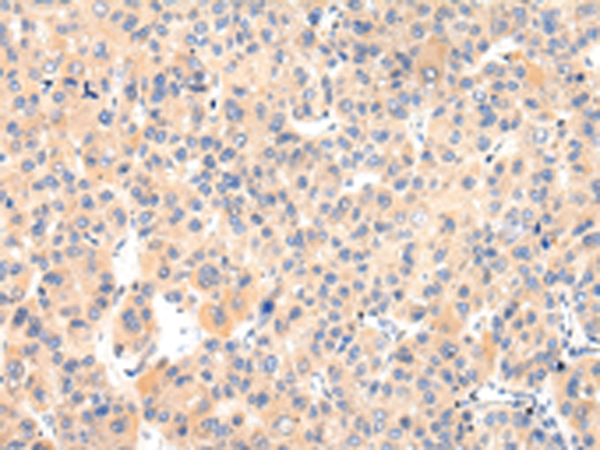

| WB | 1/200-1/1000 | Human,Mouse,Rat |
| IF | 咨询技术 | Human,Mouse,Rat |
| IHC | 1/25-1/100 | Human,Mouse,Rat |
| ICC | 技术咨询 | Human,Mouse,Rat |
| FCM | 咨询技术 | Human,Mouse,Rat |
| Elisa | 1/1000-1/2000 | Human,Mouse,Rat |
| Aliases | KIAA1036 |
| WB Predicted band size | 41 kDa |
| Host/Isotype | Rabbit IgG |
| Antibody Type | Primary antibody |
| Storage | Store at 4°C short term. Aliquot and store at -20°C long term. Avoid freeze/thaw cycles. |
| Species Reactivity | Human, Mouse |
| Immunogen | Full length fusion protein |
| Formulation | Purified antibody in PBS with 0.05% sodium azide and 50% glycerol. |
+ +
以下是3篇关于VASH1抗体的参考文献,简要概括内容如下:
---
1. **文献名称**: *Vasohibin-1 (VASH1) as a prognostic marker in colorectal cancer*
**作者**: Watanabe K, et al.
**摘要**: 该研究利用VASH1抗体通过免疫组化分析结直肠癌组织,发现VASH1高表达与肿瘤血管生成减少和患者生存期延长相关,提示其可作为预后标志物。
---
2. **文献名称**: *VASH1 regulates oxidative stress and angiogenesis via interaction with SOD2*
**作者**: Shibuya T, et al.
**摘要**: 研究通过Western blot和免疫共沉淀技术,揭示VASH1抗体检测到其与超氧化物歧化酶2(SOD2)的相互作用,表明VASH1通过调控氧化应激抑制病理性血管生成。
---
3. **文献名称**: *The role of VASH1 in diabetic retinopathy: Insights from murine models*
**作者**: Kim YH, et al.
**摘要**: 使用VASH1抗体在小鼠糖尿病视网膜病变模型中证实,VASH1表达上调可减少异常血管增生,并通过抑制VEGF信号通路缓解视网膜病变进展。
---
如果需要更具体的文献年份或补充DOI信息,可进一步补充检索数据库(如PubMed或Web of Science)。
The vasohibin-1 (VASH1) antibody is a tool used to detect VASH1. a protein encoded by the *VASH1* gene, which plays a critical role in regulating angiogenesis. Initially identified as an endogenous angiogenesis inhibitor, VASH1 is expressed predominantly in vascular endothelial cells and is induced by pro-angiogenic factors like VEGF. It counteracts excessive blood vessel formation by modulating endothelial cell migration and tubule remodeling, often through interactions with its binding partner small vasohibin-binding protein (SVBP). VASH1 also participates in microtubule detyrosination, influencing cellular dynamics beyond angiogenesis.
Antibodies against VASH1 are widely utilized in research to study its expression, localization, and function in physiological and pathological contexts. For example, they help investigate VASH1's dual role in cancer—acting as both a tumor suppressor by limiting vascularization and a potential promoter of metastasis through mechanisms involving cell motility. These antibodies are applied in techniques like Western blotting, immunohistochemistry, and immunofluorescence. Dysregulation of VASH1 has been linked to diseases such as retinopathy, atherosclerosis, and inflammatory disorders, making its study relevant for therapeutic development. Commercial VASH1 antibodies are typically validated for specificity across human, mouse, and rat samples, aiding translational research. Ongoing studies explore its diagnostic or prognostic value in vascular-related pathologies.
×